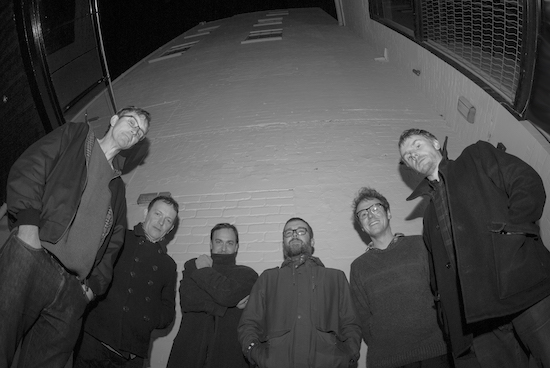“Bands who stick with the same sound album after album are lying to you,” Hey Colossus bassist Joe Thompson remarks as part of a recurring theme in his new book for Pomona’s Sleevenotes series. “They’re doing it because it’s what got them success. They’re scared of progress. Very few bands change sound and keep their success.”
Thompson’s endorsement of progress (or at least challenge to the status quo) has a strong note of self-deprecation to it; over the course of 16 years and 12 albums, Hey Colossus have remained a DIY band unencumbered by any specific label’s expectations. But any brief traipse through the band’s back catalogue will confirm that Hey Colossus have not been static. Their latest album, Four Bibles, supports this aspiration to keep progressing — not just compared to how they approached their work 15 years ago but even to their most recent studio album, 2017’s The Guillotine.
There is a live wire buzz running through the entirety of Four Bibles. It’s there in the initial fade-in of ‘Bees Around the Lime Tree’ and holds through the fade out of the title track. It’s not a drone, though; the songs are too spiky for that. This warbling static prepares you for an onslaught of heaving, chugging rhythm. On first listen it sounds like getting hit by a sledgehammer of sludge, but the dimensions slowly come through. Three or four guitars (before the overdubs) can be hard to parse, but though the individual lines are difficult to distinguish, the layered effect moulds the sound.
This complexity is what makes noise invigorating rather than monotonous. While the higher end of the guitars and electronics ring in your ears, the bass notes are hitting at your central nervous system, stimulating your fight or flight response. It’s not to say that the music sounds panicky, but
Four Bibles has energy. It has frazzled electric undercurrents, as on ‘(Decompression)’. Some of the tracks, like ‘Confession Bay’ and ‘Babes of Plague’, combine that frazzled energy with traditional enough song structures to play at being pop songs that could blot you out with noise at a hairpin turn.
Paul Sykes has also changed up his vocals enough that he could toy with these different song structures. Some of the bombast of his earlier work has been stripped away — along with the effects on his vocals — and he’s allowed himself to move into a higher register. He may leave his voice to the mercy of the volume of the arrangement, but it feels like a character he was performing has been abandoned. This is most evident on ‘It’s a Low’. The song breaks down from that persistent chug to a conventionally beautiful outro of piano and violin (provided by Daniel O’Sullivan of Grumbling Fur and, lately, This is Not This Heat), with a vocal from Sykes that sounds straight-up vulnerable. It’s a song that’s hard to imagine on a previous Hey Colossus record.
Thompson’s Sleevenotes book was published as a parallel to Four Bibles. Over the course of 250 pages, he relates stories of songs and tours and the early sessions for the new album. You don’t need the book to appreciate the development of Four Bibles, but reading Thompson’s reflections on what it means to be in a band for more than 15 years while juggling a full-time job, a family, and a mortgage will give you a different perspective on what it means to create art of any kind when art isn’t your sole occupation (it also fills in some gaps on their discography which, according to a delightful note on the Bandcamp page for Dedicated to Uri Klangers, “is a bit of a mess”). But then Hey Colossus have also worked to make Four Bibles give you a different perspective on their music: Band members have changed again. Sounds have altered. They wouldn’t lie to you.


